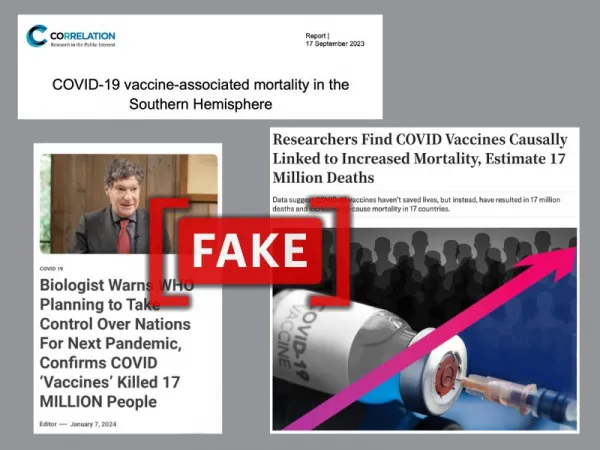By: Iryna Hnatiuk
January 11 2024
 Source: Correlation Research in the Public Interest, TikTok, Epoch Times / Screenshot modified by Logically Facts
Source: Correlation Research in the Public Interest, TikTok, Epoch Times / Screenshot modified by Logically Facts
There’s no data to confirm that the COVID-19 vaccine is linked to increased mortality. This publication’s conclusion is flawed.
Context
A claim circulating on social media (archived here) alleges that 17 million people have died as a result of COVID-19 vaccination. The claim gained traction after this specific number was mentioned in a recent conversation between former Fox News host Tucker Carlson and evolutionary biologist Bret Weinstein. The latter said, “I was recently at a conference in Romania on the COVID crisis and so there was a lot of work trying to unpack what we actually understand. And I saw a credible estimate of something like 17 million deaths globally from this technology.”
During the interview, no source was provided for the figure, nor was the name of the alleged conference.
In fact
On September 17, 2023, a not-for-profit organization, Correlation Research in the Public Interest, published a non-peer-reviewed study titled "COVID-19 vaccine-associated mortality in the Southern Hemisphere”. The material concludes:
"We quantify the overall all-ages vDFR [vaccine-dose fatality rate] for the 17 countries to be (0.126 ± 0.004)%, which would imply 17.0 ± 0.5 million COVID-19 vaccine deaths worldwide, from 13.50 billion injections up to 2 September 2023.”
This is the sole source referencing the figure of "around 17 million deaths from the COVID-19 vaccine." Other publications, including Epoch Times, a known misinformation spreader, cite this particular publication.
The analysis in this study is highly flawed. The authors concluded that there was a correlation between the increased mortality spikes observed after vaccination and the vaccine rollout. However, correlation alone doesn't imply a causal connection.
Another concern is that the authors did not clarify whether the people who died had been vaccinated. The all-cause mortality data they used pertained to the population as a whole, lacking individual-level data. Verifying the vaccination status of people who died should have been an initial step in such analysis. Without this information, it’s impossible to reliably draw causal inferences between vaccination and death.
The analysis also failed to explore the possibility of COVID-19 as a potential explanation for the observed spikes in excess mortality. Jeffrey Morris, a biostatistician and professor at the University of Pennsylvania, questioned the study’s validity on X (former Twitter), highlighting that the peaks in excess mortality closely coincided with increases in COVID-19 deaths.
The peaks in excess mortality closely coincided with increases in COVID-19 deaths. (Source: George S. Pepper Professor of Public Health & Preventive Medicine, X)
Spencer Fox, associate director for the University of Texas COVID-19 Modeling Consortium, commented similarly to AP, saying, “If you compare the excess deaths numbers to the total COVID reported death numbers, most of those deaths are going to be from COVID itself.”
Dr Amesh Adalja, a senior scholar at the Johns Hopkins Center for Health Security, told Logically Facts, “What purveyors of this misinformation are doing is misusing statistics in order to confuse people and condemn vaccines, which have actually saved lives. They use simple correlation to try and show that where vaccination rates are high excess mortality may be high. What this pseudo-analysis ignores is the fact that it is likely COVID-19 that is causing the excess deaths, driving increased vaccination rates. They have it completely backwards, but I think they know that and seek to cause people to make poor decisions regarding the vaccines irrespective of the objective reality that they evade.”
Data provided by the World Health Organization and represented in a chart by Our World In Data demonstrates how the higher quantity of cumulative COVID-19 vaccinations per 100 people leads to lower figures in daily new COVID-19 deaths per million people.
Statistical data confirms that an increase in the number of vaccinated individuals has been reducing the number of COVID-19 deaths. (Source: Our World In Data)
A CDC study examining the period between December 2020 and July 2021 found that COVID-19 vaccine recipients had lower rates of non-COVID-19 mortality.
One of the authors of the material published by Correlation Research in the Public Interest is Denis Rancourt — a former physics professor at the University of Ottawa and a co-director of this organization. Rancourt is a member of the group Panda, which routinely promotes COVID-19 denialism and vaccine misinformation.
Rancourt also appeared in an interview with the World Council for Health where he denied a COVID pandemic. The World Council for Health is a pseudo-medical organization spreading misinformation about COVID-19 and the vaccination campaign.
A list of studies on the safety of COVID-19 vaccination and its impact can be found here. More fact-checks by Logically Facts related to COVID-19 vaccination can be found here.
The verdict
There is no data to support the claim that COVID-19 vaccines caused the death of 17 million people. The non-peer-reviewed material published by the non-profit organization Correlation Research in the Public Interest is flawed. Its co-author has previously made anti-vaccination claims. Published data confirms that the overall mortality rate coincides with an increase in COVID-19 cases. Hence we have marked the claim as false.
The COVID-19 pandemic has given rise to a lot of potentially dangerous misinformation. For reliable advice on COVID-19, including symptoms, prevention, and available treatment, please refer to the World Health Organization or your national healthcare authority.